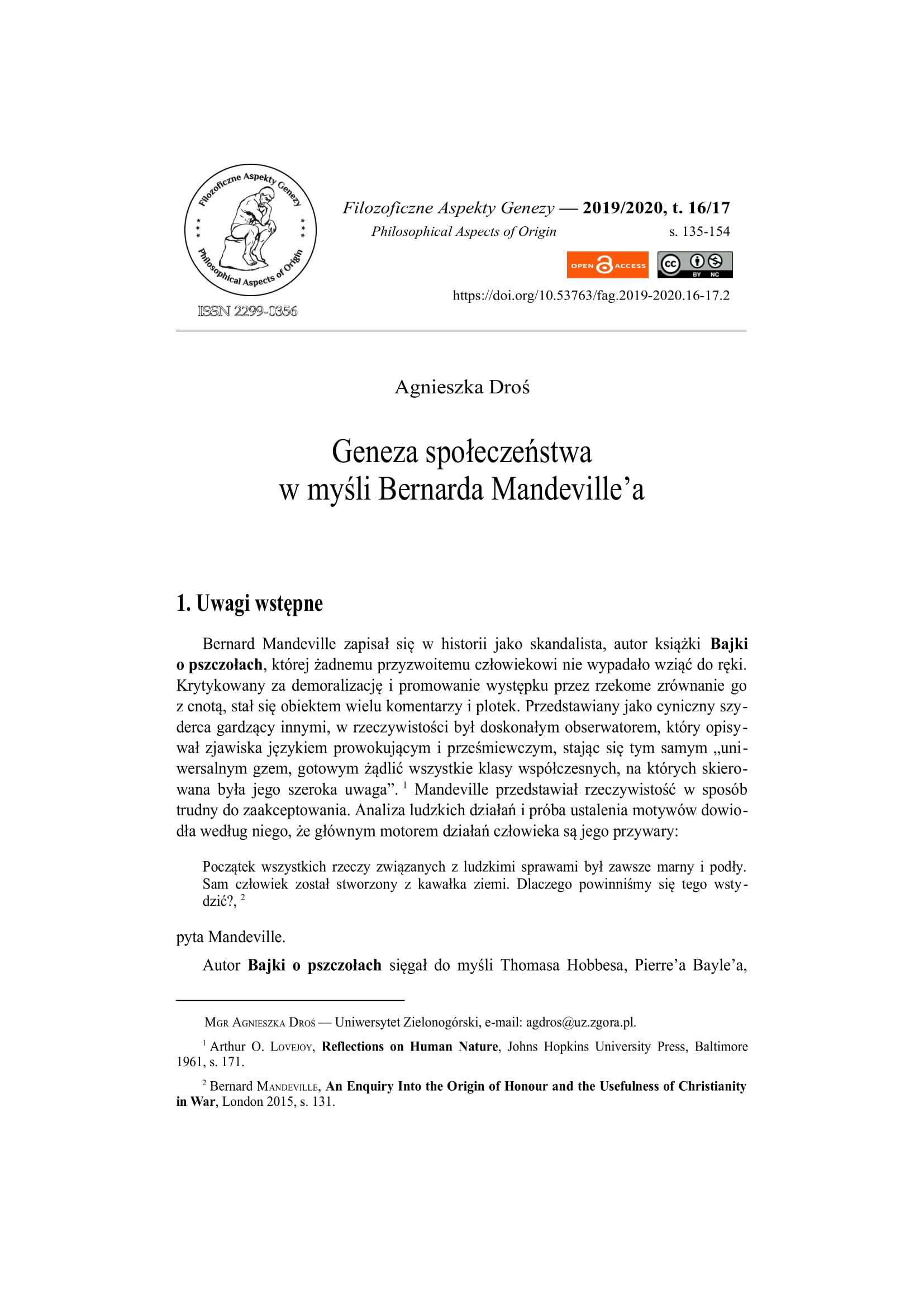
Opublikowane 20.01.2022 — zaktualizowane 22.01.2022
Wersje
- 22.01.2022 - (3)
- 22.01.2022 - (2)
- 20.01.2022 - (1)
Słowa kluczowe
- Bernard Mandeville,
- Oświecenie angielskie,
- geneza społeczeństwa,
- powstanie języka,
- historia przypuszczalna
- natura ludzka,
- Bajka o pszczołach ...More

Utwór dostępny jest na licencji Creative Commons Uznanie autorstwa – Użycie niekomercyjne 4.0 Międzynarodowe.
Jak cytować
Abstrakt
W artykule przedstawiono paradoks prywatnych przywar i korzyści publicznych Bernarda Mandeville’a na przykładzie jego poglądów na genezę społeczeństwa w oparciu głownie o drugi tom Bajki o pszczołach i The Origin of Honour and the Usefulness of Christianity in War [Pochodzenie honoru i przydatność chrześcijaństwa w wojnie]. Ewolucyjny proces rozwoju społeczeństwa ukazany w tekście różni się od poglądów prezentowanych przez autora w pierwszym tomie Bajki, kładzie bowiem nacisk na długotrwały i spontaniczny charakter postępu dokonanego przez ludzi o niewybitnych umysłach. W swoich rozważaniach Mandeville pozostaje przy kluczowym dla siebie temacie natury ludzkiej i istotności ludzkich przywar w poprawnym funkcjonowaniu grup społecznych. Kontynuuje dywagacje rozpoczęte w pierwszym tomie Bajki nad tym, kim człowiek w rzeczywistości jest. Temat powstania społeczeństwa wpisuje się w deklarowany przez niego cel, jakim jest sprawienie by ludzie lepiej rozumieli samych siebie.
Downloads
Bibliografia
- Alter Stephen G., Okręt Mandeville’a. Rola teistycznej idei projektu i inspiracje filozoficzne w Darwinowskiej wizji doboru naturalnego, przeł. Grzegorz Malec, Filozoficzne Aspekty Genezy 2019/2020, t. 16/17, s. 83-118, https://doi.org/10.53763/fag.2019-2020.16-17.7 [29.06.2020].
- Braga Joaquim, Hypothetical Thought Mandeville’s Deconstructive Genealogy of Sociability, I castelli di Yale online 2016, vol. 4, no. 2, s. 145-159, https://tiny.pl/95s9k [29.06.2020].
- Hobbes Tomasz, Lewiatan, przeł. Czesław Znamierowski, Biblioteka Klasyków Filozofii, Państwowe Wydawnictwo Naukowe, Warszawa 1954.
- Höpfl H.M., From Savage to Scotsman: Conjectural History in the Scottish Enlightenment, Journal of British Studies 1978, vol. 17, no. 2, s. 19-40.
- Horne Thomas A., Envy and Commercial Society: Mandeville and Smith on «Private Vices, Public Benefits», Political Theory 1981, vol. 9, no. 4, s. 551-569.
- Jones Tom, Theories of Language in the Eighteenth Century, https://tiny.pl/95s93 [03.05.2021].
- Kaye Frederick B., Introduction, w: Mandeville, The Fable of the Bees…, vol. I, s. CXLIIl-CXLIV, https://tiny.pl/95s9z [10.02.2021].
- Kaye Frederick B., Mandeville on the Origin of Language, Modern Language Notes 1924, vol.. 38, no. 3, s. 136-142.
- Knott Martin O., Mandeville on Governability, The Journal of Scottish Philosophy 2014, vol. 12, no. 1, s. 19-49.
- Lovejoy Arthur O., Reflections on Human Nature, Johns Hopkins University Press, Baltimore 1961.
- Mandeville Bernard, A Treatise of the Hypochondriack and Hysterick Diseases (1730), ed. Sylvie Kleiman-Lafon, Springer, Cham 2017.
- Mandeville Bernard, An Enquiry Into the Origin of Honour and the Usefulness of Christianity in War, London 2015.
- Mandeville Bernard, Bajka o pszczołach, przeł. Agnieszka Glinczanka, Państwowe Wydawnictwo Naukowe, Kraków 1957.
- Mandeville Bernard, Skromna obrona domów publicznych, przeł. Marian Skrzypek, Fundacja Augusta hr. Cieszkowskiego, Warszawa 2016.
- Mandeville Bernard, The Fable of the Bees, vol. I, Clarendon Press, Oxford 1988.
- Mandeville Bernard, The Fable of the Bees, vol. II, Clarendon Press, Oxford 1988, https://tiny.pl/95swh [10.02.2021].
- Ossowska Maria, Motywy postępowania. Z zagadnień psychologii moralności, Książka i Wiedza, Warszawa 1958.
- Palmeri Frank, Bernard de Mandeville and the Shaping of Conjectural History, w: Pires and Braga (eds.), Bernard de Mandeville’s Tropology of Paradoxes…, s. 15-24.
- Paxman David, Language Theory and National Character in the Eighteenth Century, s. 28-38, https://tiny.pl/95swm [03.05.2021].
- Pires Edmundo B. and Braga Joaquim (eds.), Bernard de Mandeville’s Tropology of Paradoxes: Morals, Politics, Economics, and Therapy, Springer, Cham 2015.
- Prendergast Renee, Accumulation of Knowledge and Accumulation of Capital in Early «Theories» of Growth and Development, Cambridge Journal of Economics 2010, vol. 34, no. 3, s. 413-431.
- Prendergast Renee, Knowledge, Innovation and Emulation in the Evolutionary Thought of Bernard Mandeville, Cambridge Journal of Economics 2014, vol. 38, no. 1, s. 87-107.
- Primer Irwin (ed.), Mandeville Studies — New Explorations in the Art and Thought of Dr. Bernard Mandeville (1670-1733), Springer, Haga 1975.
- Rogowska Beata, 300 lat po wielkim skandalu. Wkład Bajki o pszczołach B. Mandeville’a do ekonomii, Kwartalnik Historii Myśli Ekonomicznej 2014, nr 1, s. 85-112.
- Rousseau George S., Mandeville and Europe: Medicine and Philosophy, w: Irwin Primer (ed.), Mandeville Studies…, s. 11-21.
- Schreyer Rüdiger, Condillac, Mandeville, and the Origin of Language, Historiographia Linguistica 1978, vol. 5, no. 1-2, s. 15-43.
- Schreyer Rüdiger, The Origin of Language: A Scientific Approach to the Study of Man, Topoi 1985, vol. 4, no. 2, s. 181-186, https://tiny.pl/911p8 [03.05.2021].
- Simonazzi Mauro, Atheism, Religion and Society in Mandeville’s Thought, w: Pires and Braga (eds.), Bernard de Mandeville’s Tropology of Paradoxes…, s. 221-242.
- Simonazzi Mauro, Bernard Mandeville on hypochondria and Self-Liking, Erasmus Journal for Philosophy and Economics 2016, vol. 9, no. 1, s. 62-81.
- Tolonen Mikko, The Gothic Origin of Modern Civility: Mandeville and the Scots on Courage, s. 1-16, https://tiny.pl/95s9n [29.06.2020].
- Winch Donald, Mandeville, Rousseau, and the Paradox in Favour of Luxury, w: Winch, Secret Concatenations…, s. 1-20, https://tiny.pl/911pl [15.08.2020].
- Winch Donald, Secret Concatenations: Mandeville to Malthus, Oxford 1995.
- Yuran Noam, A Moralistic Failure: Mandeville and the Obscene Origin of Economic Thought, Social Research 2016, vol. 83, no. 3, s. 573-595.


